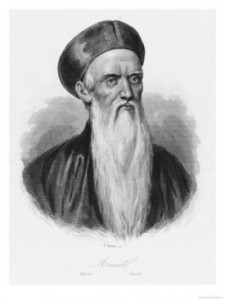Elif Akçetin
University of Illinois at Chicago
Hymne mantchou chanté à l’occasion de la conquête du Jin-chuan
Manchu hymn chanted at the occasion of the victory over the Jinchuan Rebels
Hymne mantchou is a manuscript handwritten by Jesuit Father Amiot and addressed to minister and grand secretary Monseigneur de Bertin on May 11th, 1779. The document is a scanned copy of the original which is held in the Bibliothèque nationale in Paris. It contains an explanatory letter and a transcription of a Manchu hymn chanted to celebrate the victory of the Qing armies over the Jinchuan rebels in 1776.
The hymn was performed in two different cultural contexts. The first performance was in Chinese at the reception given to the honor of general Agui in 1776 (Amiot had been unable to obtain a Chinese copy on the grounds that state documents of that sort could not be publicized. His contact eagerly provided him with a Manchu copy). The second one was in Manchu and according to the information Amiot received, it took place at a banquet attended by imperial princes, generals and bannermen and was accompanied by a dance. The hymn regained life in a third cultural context when Amiot translated it into French. In 1792 its reception was widened when it was edited and published by Louis Langlès.
There exist some noticeable differences between the Manchu hymn and Amiot’s translation. The third verse in the quatrain below, “the leader of the bandits went into hiding” becomes in Amiot’s translation “the barbarians ran to find refuge in their caverns.” The word hūlha (bandits) is translated by Amiot as “barbarian.” The crucial question is: Did the military audience of the Manchu hymn have in mind a cultural distinction “barbarian vs. civilized” (i.e. Was hūlha ever understood to mean “barbarian” as in the Chinese 夷?) Or did Amiot impose on the poem such a distinction in order to render it more meaningful to a French-speaking audience?
An analysis of the rest of the hymn gives some hints. The Manchu hymn celebrated general Agui’s skills in military strategy and the Qing armies’ military superiority over those of the rebels. The rebels are depicted in very strong terms as cruel and evil: they rejected the emperor’s goodwill and thus deserved the attacks of the Qing armies. The idea conveyed in the hymn is not a cultural distinction but a celebration of the mighty Qing state over the unruly rebels. Amiot’s translation, on the other hand, not only downplays the forcefulness of the original but also frames it in terms of a cultural distinction.
(Page 5)
Dailara jiyanggiyūnsa be takūraha
Daau deri Meino be gaiha
dalaha hūlha jailaha ofi
dain de tsewang be jafame baha
Generals were sent to undertake a punitive expedition
and captured Daau through Meino
Tsewang, the leader of the bandits, went into hiding
(but our generals) grappled him in battle
Amiot’s translation
On envoya des généraux pour les réduire
depuis Tao jusqu’à Meino tout fut bientôt conquis
Consternés alors, les barbares courent se mettre en sûreté dans leurs cavernes
mais Tsêouang, leur chef est pris en combatant
[We sent generals to overcome them
From Tao to Meino all was conquered
Disconcerted, the barbarians ran to find refuge in their caverns
but their leader Tsewang was taken captive in battle]
Vocabulary
bahambi: to get, to obtain
dailambi: to make war against, to undertake a punitive expedition against
dain: war, battle
dalaha hūlha: the leader of the bandits
gaimbi: to take
jafambi: to seize, to take hold of one’s opponent (at wrestling)
jailambi: to avoid, to get out of the way of, to shun, to hide
takūrambi: to send on a mission, to delegate, to commission
You can view the original manuscript here.
Or download the published version here.

